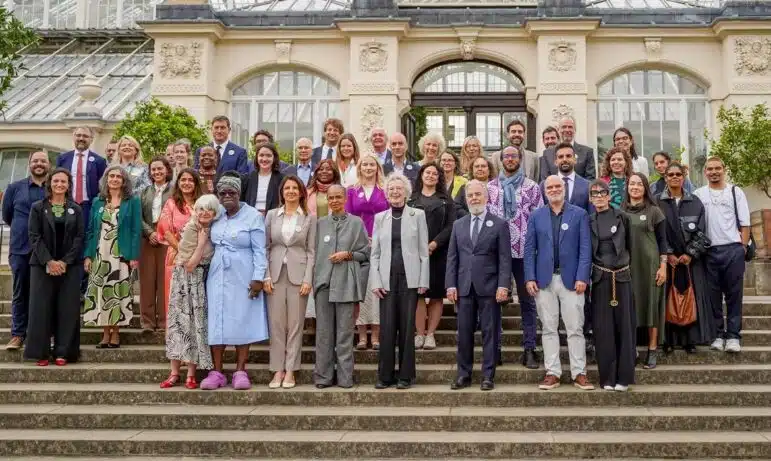
Karenna Gore to Serve as North America Co-Leader for UN Global Ethical Stocktake
Updated July 25, 2025
The Center for Earth Ethics is honored to announce that Executive Director Karenna Gore will serve as the regional co-leader for the North America Dialogue of the Global Ethical Stocktake (GES), a groundbreaking initiative leading up to the 2025 United Nations Climate Conference (COP30) in Belém, Brazil, in November. Featuring six dialogues from around the world, the GES seeks to elevate the moral and ethical dimensions of the climate crisis. For the North America Dialogue in September, Gore will help gather diverse voices—including youth, elders, Indigenous leaders, artists, philosophers, scientists and faith representatives—to reflect on the deeper values that should guide climate action.
Why Ethics?
The scientific and technical understanding of the climate crisis is clearer than ever, particularly in negotiation rooms at COPs. Yet a robust reflection on the moral and ethical dimensions is usually missing. The Brazilian COP30 presidency has undertaken the GES in recognition that we must come to an understanding of how ethics can guide our collective responses.
The GES is a unique and necessary moral intervention that asks not only what we are doing to the Earth, but also what we have allowed ourselves to become in the process, and how we can summon the collective will to change course. These global dialogues are a historic milestone marking a new level of commitment from the COP presidency toward transparency, inclusion and action. This is an opportunity to set an important precedent that contextualizes scientific research, emphasizes the voices of marginalized communities, respects traditional ecological knowledge, and has the power to fundamentally reframe how we tackle the climate crisis.
The GES is a unique and necessary moral intervention that asks not only what we have done to the Earth, but what we have allowed ourselves to become in the process.
How Does the GES Work?
The Circle of the Global Ethical Stocktake is one of the four “Leadership Circles” established by the COP30 presidency. Led by Brazilian President Luiz Inácio Lula da Silva and UN Secretary-General António Guterres, it is facilitated by a committee including the COP30 Presidency, Brazil’s Ministry of the Environment and Climate Change, Brazil’s Ministry of Foreign Affairs and the UN.
The GES will convene six official dialogues spread across the globe: Africa; Asia; Central and South America and the Caribbean; Europe; North America; and Oceania. Supporting the Brazil-based leadership team, a regional co-leader will help organize each dialogue. In addition to Gore, the other co-leaders are Wanjira Mathai (Africa Dialogue), Kailash Satyarthi (Asia Dialogue), Michelle Bachelet (Central and South America and the Caribbean Dialogue), and Anote Tong (Oceania Dialogue). Mary Robinson already co-led the European Dialogue in June.
Each dialogue will bring together approximately 25 participants, including youth, religious leaders, women, Afro-descendant people, Indigenous Peoples, philosophers, business leaders, scientists and artists. Over a few hours, participants will reflect on guiding questions about the ethical dimensions of the climate crisis and the moral foundations of the necessary responses. In addition, the GES centers culture and will include artistic inventions. Key themes and recommendations will be compiled into a report to be delivered to the Heads of State and COP30 negotiators.
It is essential that we center ethics when a deeply felt and more and more widely shared sense of right and wrong is out of step with laws and social norms.
Karenna Gore
Touchpoints
On Tuesday, June 17, Brazil’s Ministry of the Environment and Climate Change held a virtual press briefing presenting the Global Ethical Stocktake (GES), at which CEE Executive Director Karenna Gore spoke. Other speakers included André Corrêa do Lago, Marina Silva, Selwin Hart, Antônio Patriota, Wanjira Mathai, and Mary Robinson.
During her remarks, Gore emphasized the importance of centering ethics during times “when a deeply felt and more and more widely shared sense of right and wrong is out of step with laws and social norms.” She highlighted historical precedents for social movements animated by an ethical grounding, including the Abolition Movement. The legalization and normalization of ecological destruction today similarly calls for an ethical response, she said.
The GES process officially launched with the European Dialogue on Tuesday, June 24, in Kew Gardens, London. Co-led by Mary Robinson, who has served as the President of Ireland and the United Nations High Commissioner of Human Rights, the event featured interventions from speakers like Mara Ghilan, a Romanian climate activist and policy co-lead for YOUNGO; Daze Aghaji, a British climate activist and founder of Extinction Rebellion Youth UK; Emilie Laurence Tubiana, CEO of the European Climate Foundation and co-author of the Paris Agreement; and Brice Böhmer, Transparency International’s Global Climate and Environment Coordinator. One particularly powerful story came from Rosamund Adoo-Kissi-Debrah, a British activist who founded The Ella Roberta Foundation to honor her daughter’s legacy after she died at age nine from an asthma attack brought on by air pollution. Gore attended the gathering, describing it as “a fresh and honest exploration of the moral costs of our ecological circumstances and the ethical tools we have to break through them.”
How Can You Get Involved?
While the six official regional dialogues are essential touchstones in the Global Ethical Stocktake process, the GES leadership recognizes that truly inclusive representation must include a groundswell of community engagement worldwide. To expand the reach far beyond formal, closed circles, they are actively encouraging grassroots participation around the world. To that end, the COP30 team has developed a toolkit to guide communities, organizations and individuals to host their own self-organized dialogues and to share their reflections directly with the GES Steering Committee.
To learn more and access supporting resources, visit CEE’s website or contact CEE Director of Strategic Initiatives Samira Siddique.
NB. This post has been updated to include the full list of regional co-leaders and to clarify titles.

